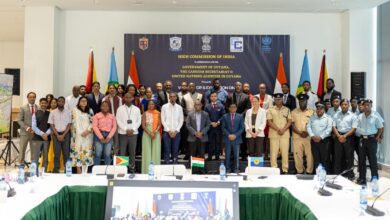-
The Fourth CARICOM-Central America Ministerial Meeting was held in Georgetown, Guyana, 22 March 1999. Ministers welcomed the Dominican Republic and expressed their satisfaction at that country’s participation in the Meeting.
-
Ministers met to analyse the development of relations between both sub-regions with the objective of continuing to advance issues of mutual interest, in an open spirit of cooperation among all the States taking part in this dialogue.
-
Ministers reaffirmed that these relations are founded on the basic principles of the United Nations Charter and the Charter of the OAS, in particular those referring to democracy, peace, liberty and development, within a framework of respect for human rights, the rule of law, and the commitment of Governments to seek to improve the standard of living for their peoples.
-
Ministers exchanged views on the political, social and economic challenges facing the two sub-regions, recognising that globalisation, integration and international flows in the world capital, financial and commercial markets, represent a challenge, and impact on all spheres of activity in their countries.
-
As a result of Ministerial exchanges, and based on the approved agenda of the meeting, Ministers reviewed several issues of a political, economic, social and environmental nature, as well as forms of functional cooperation. In this respect, Ministers agreed on the need to improve existing mechanisms for the coordination of positions and concerns vis-a-vis regional and international fora, as well as third countries, with the firm objective of strengthening the leadership of both sub-regions in the hemisphere and in the world. In this context, special attention is to be paid to the regional candidatures presented for the forthcoming elections for the opportunity that this presents for the two sub-regions. Ministers agreed that they would continue their collaboration to secure the increased relevance and effectiveness of the OAS in responding to the challenges and concerns of its member states. They pledged to redouble their efforts to ensure an adequate response to the special needs and interests of small states, in support of their development.
-
In this context, Ministers renewed their commitment to the CARICOM-Central America Framework Cooperation Programme and mandated the High-level Technical Committee to meet within six months in order to define joint strategies in the different areas of mutually agreed cooperation.
COOPERATION ON THE PRESERVATION OF THE ENVIRONMENT
AND THE CARIBBEAN SEA
- Ministers recognised that efforts have increased in the two sub-regions to promote the design of policies and programmes that could guarantee environmental protection and expand international cooperation as a means of achieving a model of sustainable development capable of preserving the natural resources of the Caribbean Basin.
- They reiterated their support for the endeavours of the Central American region to advance an integrated development strategy that harmoniously combines the quest for improved living standards for the peoples of the region with the protection of the environment. In this regard, they reaffirmed their support for the Central American Alliance for Sustainable Development which seeks to ensure the well-being of present and future generations in Central America.
- They also reiterated their support for the Barbados Programme of Action adopted at the United Nations Global Conference on the Sustainable Development of Small Island Developing States held in Barbados, in 1994. They recognised the utility of the activities identified in the Programme of Action to the sustainable development of all small island developing states. They therefore welcomed the convening by the United Nations General Assembly (UNGA) in September 1999 of a Special Session to Review the Implementation of the Barbados Programme of Action.
- Ministers welcomed the CARICOM proposal to have the Caribbean Sea internationally recognised as a Special Area in the context of Sustainable Development and endorsed the efforts of CARICOM to have this issue included in the Caribbean Environmental Strategy being developed by the Association of Caribbean States (ACS). They expressed their willingness to jointly promote a proposal at the Seventh Meeting of the Commission on Sustainable Development (CSD) and at the Special Session of the United Nations General Assembly.
- Ministers considered the Caribbean Sea an invaluable part of the region’s patrimony and agreed to give special priority to its preservation. They therefore deplored its ecological degradation and rejected its continued use for the transit of toxic and nuclear waste. Ministers joined in the Statement made at the Tenth Inter-Sessional Meeting of the Conference of Heads of State and Government of CARICOM on the Movement of Nuclear Material through the Caribbean Sea and recommended that the Statement be considered for adoption by Heads of State and Government at the Second Meeting of the Association of Caribbean States.
COOPERATION ON THE MITIGATION OF NATURAL DISASTERS
- Ministers expressed their deep distress at the tragedy occasioned by the passage of Hurricanes Georges and Mitch in 1998, which affected many countries of both sub-regions. They expressed their mutual solidarity in the face of the loss of life, as well as the enormous damage to their economies, agriculture and infrastructure. They also urged the Regional Commission for Water Resources (CRRH) and the Caribbean Meteorological Institute (CMI) to continue to strengthen cooperation in their respective areas of competence.
- Ministers expressed their satisfaction at the joint initiatives being undertaken by CDERA and CEPREDENAC to enhance cooperation, consultation and information exchange in the area of natural disaster management. They encouraged the two institutions to strengthen their collaboration and to continue to offer their expertise in support of the ACS Working Group on Natural Disasters. They recognized that the poor are the most vulnerable to the hazardous impacts of natural disasters and stressed the need to incorporate, in the two sub-regions, loss reduction consideration into poverty alleviation programmes, especially at the community level.
POVERTY ERADICATION
- Ministers reaffirmed their commitment to continue to work together in the fight against the high levels of poverty which affect the countries of both sub-regions, through economic and social development policies which would encourage improved job creation and income for the population.
- Ministers affirmed that all persons have the right to improve their quality of life and reiterated the need for continued national efforts to meet the basic needs of citizens, such as health, housing, education and recreation. They also reaffirmed the importance of greater levels of cooperation and investment by the International Community in each of these areas.
- Ministers acknowledged the need for measures to be put in place towards ensuring sustainable human development, economic growth, equity and social justice, bearing in mind the proposal for a new Global Human Order.
CARICOM-CENTRAL AMERICA ECONOMIC RELATIONS
- Ministers reiterated that the deepening of existing commercial linkages between the two sub-regions continues to be a priority, and for this reason they agreed on the importance of a timely start to negotiations aimed at the creation, as soon as possible, of a Free Trade Area between the two sub-regions.
- Ministers agreed to continue promoting negotiations for the conclusion of air transport agreements which would facilitate and liberalise air transport in a manner consistent with the shared objective of strengthening inter-regional economic, social and cultural exchanges. Ministers took note of the work of the ACS Special Committee on Transport which has set itself the goal of uniting the Caribbean by air and sea.
- Ministers also agreed on the need to combine the efforts of the public and private sectors and relevant specialised organisations of the two sub-regions to facilitate inter alia coordination between shipping companies, provide improved information on trade flows, identify hubs and improve port infrastructure, among inter alia. The development of new means of transport, which would foster maritime investment, would also be promoted.
-
In addition, Ministers committed themselves to promote the negotiation in the shortest time possible of bilateral agreements for the reciprocal promotion and protection of investment as well as agreements for the avoidance of double taxation among countries of the two sub-regions, to support the growth of trade and investment relations.
PROMOTION OF PRIVATE SECTOR COLLABORATION
- Ministers urged renewed efforts at national and regional levels to facilitate enhanced dialogue and information flows, so that trade opportunities between the two sub-regions could be effectively pursued. They called on the various regional organizations to assist the entrepreneurs of the two sub-regions in identifying these opportunities.
- Ministers reiterated the need for the private sectors of both sub-regions to participate in Trade Fairs and Exhibitions organised by the Trade Promotion Offices and Agencies and Business Institutions of CARICOM and Central America. They agreed to institutionalize the holding of a private sector forum within the framework of their Ministerial meetings.
- They also encouraged the private sector of their respective countries to participate in the Meeting of Trade Promotion Organisations scheduled to take place in Trinidad and Tobago in 1999 within the context of the Association of Caribbean States.
COORDINATION OF STRATEGIES ON INTERNATIONAL
TRADE AND ECONOMIC POLICY
- Ministers emphasised the need to secure the expansion of trade benefits under the Caribbean Basin Initiative (CBI), and agreed on the importance of continuing joint efforts with a view to having the US Congress adopt such expansion in the shortest possible time, without including conditionalities that their countries would not be able to satisfy or which would adversely affect their ability to increase both the volume and value of their exports.
- They also reiterated their unwavering support for the establishment of a Free Trade Area of the Americas (FTAA). They emphasised the need to incorporate into this scheme, special provisions for the smaller economies of the hemisphere, in keeping with the Declaration of Santiago de Chile of April 1998. In this regard they reiterated the importance of establishing a regional integration fund to assist the smaller economies of the hemisphere in their adjustment to the FTAA, and to secure the resources necessary for the implementation of trade facilitation measures.
- In considering the challenges and opportunities presented by the process of economic globalisation, Ministers agreed to collaborate in the World Trade Organization (WTO) to ensure that the issues of vulnerability and small economies are addressed in the context of the provision for special and differential treatment, as well as in the technical cooperation programme. In this regard, they welcomed the consideration of the concerns and problems of the small economies by the WTO Committee on Trade and Development.
- Ministers also agreed to seek to encourage third countries to recognize formally the special position of the small economies in the WTO.
STRATEGIC ALLIANCE
- Ministers welcomed the proposal of the President of the Dominican Republic, to develop a “Strategic Alliance between Central America and the Caribbean”. They undertook to analyse the proposal and to submit their comments to the Secretaries-General of their respective integration systems, for them to prepare a single document for submission to their corresponding Member States within a reasonable time frame, and for its early signature.
TOURISM
- Ministers noted the progress which had been made in the area of tourism, particularly in the context of the development of a Sustainable Tourism Zone of the Caribbean which was being pursued within the ACS. They noted with satisfaction that the proposal for the establishment of the Zone would be submitted for approval to the Second Summit of the ACS, to be held in Santo Domingo de Guzman, 16-17April 1999.
- Ministers agreed to consider a proposal for the removal of visa requirements for short stay visitors in order to promote tourism among their respective countries and encourage contacts among their peoples.
COOPERATION IN AGRICULTURE
- Ministers stressed that the agricultural sector continues to be of fundamental importance to the economies of both sub-regions.
- They also emphasised the significant initiative in agricultural cooperation adopted in the Joint Meeting of Ministers of Agriculture of Central America and of CARICOM in May 1997, from which flowed a programme of inter-institutional cooperation in the areas of trade and competitiveness, technology, phytosanitary matters, removal of language barriers and the fostering of youth exchanges.
- Ministers expressed their support for this initiative, which now forms an integral part of the Programme for Horizontal Technical Cooperation between Latin America and the Caribbean (CARILAC), a programme being implemented by the Inter-American Institute for Cooperation on Agriculture (IICA).
COOPERATION IN SCIENCE AND TECHNOLOGY
- Ministers recognised the importance of Science and Technology as the basis for sustainable development and to this end emphasised the need for increased interaction among Science and Technology Institutions of the two sub-regions.
- Ministers agreed that special attention be given to the use of information technology, its development and sharing, as well as training and capacity building and the promotion of joint efforts on appropriate technologies.
FIGHT AGAINST THE ILLICIT TRAFFIC IN DRUGS AND FIREARMS
- Ministers noted the continuing efforts by the Governments of both sub-regions to counteract the illicit traffic in drugs and related criminal activity. Given the fact that this menace constitutes a serious threat to democracy, they emphasised the urgent need to take action to prevent, control and to impose sanctions on these illicit activities. They recognised that the fight against the illicit traffic in drugs constitutes a shared responsibility especially with the producing and consuming countries. This therefore required an integrated and balanced approach of national and international efforts.
- Ministers commended the work of the Inter-American Commission for the Control of the Abuse of Drugs (CICAD) of the OAS which they recognized as one of the most important avenues for attaining the region’s objectives in the fight against drugs. They agreed that CICAD should remain the primary mechanism through joint efforts in this area without prejudice to any other form of direct cooperation.
- Ministers recalled the commitment of their Governments to the policies emanating from the UN Special Session in June, 1998, on the issue of Drugs, and to their countries’ continued efforts to exhaustively pursue measures which ensure the full implementation and execution of the activities and commitments agreed to at that Session.
- They also underscored the necessity to continue the fight against the illicit traffic in firearms, reaffirming the importance of the Inter-American Convention against the Illicit Manufacture of and Trafficking in Firearms, Ammunition, Explosives and other Related Materials (November 1997) and committed their best efforts to promote its early ratification.
LAND MINES
- Ministers recognised national and international efforts aimed at reversing the ever growing trend towards the use and transport of antipersonnel land mines, particularly its reprehensible effects on civilian populations. In this respect, they lauded the recent entry into force of the Convention to Ban the Use, Storage, Production and Transport of Antipersonnel Land Mines and their Destruction, and urged those countries which had not yet adhered to or ratified the Convention to do so.
- Ministers also stressed the importance of participating in the First Conference of States Parties, which would be held in Maputo, Mozambique, in May 1999, and which would contribute to global efforts, in the context of the Ottawa Convention, aimed at banning the use, storage, production and transport of antipersonnel land mines and ensuring their destruction.
THE ASSOCIATION OF CARIBBEAN STATES
- Ministers reviewed the work of the Association of Caribbean States (ACS) and reiterated the support of their governments for the goals and objectives of the ACS. They recognised that the ACS is currently in a very important phase of consolidation and development. They indicated the commitment of their Governments to participate at the highest level in the Second Summit of the Heads of State and Government of the countries of the ACS. This Summit will analyse the progress made by the ACS since its First Summit in 1995 in order to define a strategic position for the Association in the 21st Century.
THE SUMMIT IMPLEMENTATION REVIEW GROUP
- Ministers noted that at the Second Summit of the Americas Heads of State and Government agreed to advance a number of activities and stressed the importance of the Summit Implementation Review Group (SIRG) as a follow-up mechanism for the Summit process. They recognised that effective coordination between the two sub-regions, through regular dialogue, would result in better strategic positioning for Central America and CARICOM.
EU/LATIN AMERICA/CARIBBEAN SUMMIT
- Convinced of the need to deepen further their political, economic and cultural relations, and to strengthen the dialogue and agreements already existing between both sub-regions and the European Union, Ministers lauded the imminent convening of the First Summit of Heads of State and Government of the European Union, Latin America and the Caribbean, which will be held in Rio de Janeiro, Brazil, on 28 – 29 June 1999. They agreed on the need to join forces to guarantee that both sub-regions enjoy full and active participation in the development of the Summit, thereby ensuring their widest and most equitable representation.
FACILITATION OF TRAVEL OF DIPLOMATS AND OFFICIAL PASSPORT HOLDERS
- Ministers agreed to work towards the early removal of visa requirements for holders of diplomatic and official passports in order to facilitate travel by officials through the sub-regions.
VENUE OF THE FIFTH MINISTERIAL MEETING
- Ministers accepted the offer of the Republic of Nicaragua to host their Fifth Meeting in the year 2000.
APPRECIATION
- Ministers expressed their appreciation for the work done by the CARICOM and SICA Secretariats in pursuit of effective collaboration between the two sub-regions.
- Ministers expressed their profound gratitude to the Government and People of the Republic of Guyana for the excellent hospitality extended to their delegations and for the arrangements which ensured a successful meeting.
GEORGETOWN, GUYANA
22 March 1999





